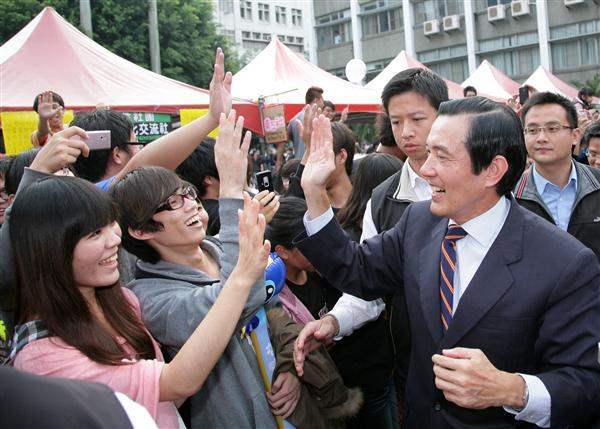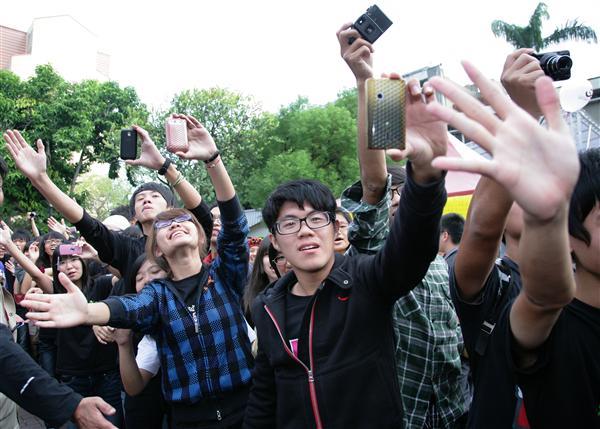News & activities
 News releases
News releases
President Ma Ying-jeou attended a celebration on the afternoon of November 12 to mark the 50th anniversary of the founding of Feng Chia University. In remarks at the event, the president presented a comprehensive blueprint and visions for such youth issues as education, employment, and the starting of families. After delivering his address, the president was accompanied by National Youth Commission Minister Lee Yun-Jie (李允傑) and Feng Chia University President Chang Pao-long (張保隆) to plant Taiwan beech trees. Together with students and faculty, President Ma congratulated the school on its golden anniversary.
In his address, the president remarked that many young people are concerned that they will find themselves unemployed upon graduation. In response, the government has initiated a program to help new graduates find employment. The president pointed out that from 2010 until the end of June 2011, a total of 2.43 million young people have received assistance in finding jobs, training, or counseling under the program. Meanwhile, data compiled by the Cabinet-level Directorate-General of Budget, Accounting and Statistics show that the unemployment rate among people between the ages of 20 and 29 has fallen from 10.61% in 2009 to 8.97% this year. The government will continue seeking to forge stronger cooperation between the academic and business communities in the future. In addition, the government will provide NT$120,000 in financial assistance over a two-year period to be used for advanced vocational training for those individuals who are unable to immediately find work upon graduation. This, he said, will boost the skills of young people in a variety of disciplines.
In addressing the issue of entrepreneurship among young people, the president stated that the government is promoting a plan that encourages graduates to return to their hometowns to start up new businesses which might be involved in local tourism, cultural and creative industries, and eco-friendly industries, he said. The government hopes that over a four-year period, over 300 firms of this sort will be started by young people. Meanwhile, the government expects within the next four years to sign working holiday agreements with more countries. This will allow young people to travel overseas and learn a lot without spending too much money, he commented. The government also plans to create a platform to provide young people with opportunities to understand the sources of traditional crafts and to pursue their interests in this respect and help pass down the nation's cultural heritage.
As for the issue of housing, President Ma remarked that the government will introduce a plan to address housing problems faced by young people who are still in school or have recently graduated. Under this initiative, students will be able to feel more secure when renting apartments, he said. In the future, dormitories at colleges and universities will continue to be built on a build-operate-transfer basis. In addition, authorities are looking into the feasibility of renting out housing above subway stations in metro areas to students in order to safeguard the housing rights of young people, he stated.
In discussing financial assistance for young people who are starting families, the president also mentioned that the government is planning to expand current assistance programs to enable each household to receive rental subsidies of up to NT$3,600 monthly for up to two years. At the same time, the government will expand mortgage subsidies, which he said is expected to benefit 70,000 households over a four-year period.
President Ma also explained the various education-related loans that students can access. To help defray living expenses, the government is raising the amount of loans that students from low income households can receive each month to NT$8,000 (up from the current NT$6,000). The government is adding a new category of loans, he said, enabling students from middle-low income households to receive assistance of NT$4,000 monthly. At the same time, students from middle-low income households will have double the amount of time to pay off their loans, he added, expressing the government's hope that these students will be able to focus their attention on studies while in school.
President Ma furthermore stated that the government is preparing to introduce a plan to encourage students to engage in innovation. He explained that over the next four years, 60 student groups from colleges and universities will each receive NT$1 million to create 120 innovative new courses. Meanwhile, another plan is being formulated to allow students at the level of senior high and above to use special accounts to go online and surf the websites of senior high schools and universities nationwide. This will enable students to gather and use information more quickly, which means students can get online and back off more quickly, thus saving money.
The president explained to the students that the government also plans to expand the Youth Travel in Taiwan plan which encourages youth to experience and learn about Taiwan. The new initiative will feature a greater emphasis on environmental protection, cultural history, and "voluntourism" so that youth can generate positive change in their travels. Furthermore, the government in fiscal 2010 has allocated over NT$70 million of funding to promote the Taiwanese Young Knight Project, which encourages youth to become involved in volunteer service. At present, over 7,000 groups have received funding and over 480,000 people have taken part in domestic and overseas service work under the program. In the future, the government will continue to create a youth volunteer education and information platform to train even more young people and further promote Taiwan's soft power, the president said.
President Ma remarked that Feng Chia University has graduated many distinguished alumni over the years, and is now preparing to spend NT$5 billion on an initiative designed to propel the university to new heights and make it a leader among Taiwan's private universities. This highlights the spirit of the university and is deeply admirable, he said. Lastly, President Ma expressed his hope that the government and the public will work together to establish Taiwan as a society characterized by freedom, democracy, prosperity, and equitable distribution of wealth.




